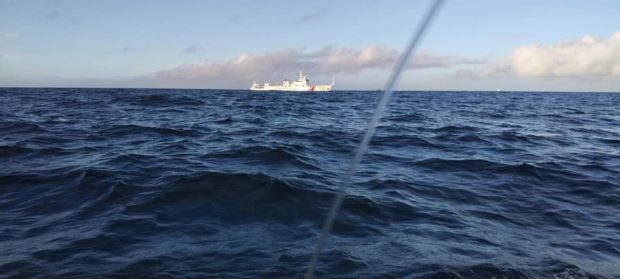PH ‘strongly opposes’ application of China coast guard law ‘beyond Beijing’s territory’

A China Coast Guard ship tries to drive away a Filipino fishing boat by blocking its path on its way to one of the sandbars near the Philippine-occupied Pag-asa (Thitu) Island in the West Philippine Sea. PHOTO FROM LARRY HUGO
MANILA, Philippines — The Philippines is “strongly opposed” to any application of China’s coast guard law “beyond the limits” of Beijing’s maritime entitlements under international law and the 2016 arbitral award on the South China Sea, which invalidated China’s expansive claims in the disputed waters.
In a statement on Friday detailing Manila’s actions to address issues concerning the West Philippine Sea, the Department of Foreign Affairs (DFA) noted that the Philippines was the first country to file a diplomatic protest against China’s new law, which would allow the Chinese Coast Guard to fire at foreign vessels in areas claimed by China.
“While enacting a law is a sovereign prerogative, the geographic area of coverage of China’s claims directly poses threat to the conduct of Philippine legitimate activities in the West Philippine Sea, which, if unchallenged, is acquiescence,” the DFA said.
Be informed of the latest developments in the West Philippine Sea Situation. SCAN the QR code or follow this link 👉🏻 https://t.co/zydU1PmhxO#DFAForgingAhead@teddyboylocsin pic.twitter.com/aF5EL7Nnb7
— DFA Philippines 🇵🇭 (@DFAPHL) February 12, 2021
“The Philippines strongly opposed any application of China’s Coast Guard Law beyond the limits of China’s maritime entitlements under the international law, including the UN Convention on the Law of the Sea and the 2016 Award on the South China Sea arbitration,” it added.
China claims nearly the entire South China Sea, including waters within the exclusive economic zones of Brunei, Malaysia, the Philippines (the West Philippine Sea), Vietnam, and Taiwan.
In July 2016, the Philippines sealed a historic win against China before the United Nations-backed Permanent Court of Arbitration in The Hague, Netherlands, which invalidated China’s “nine-dash line.” claim.
Beijing refuses to recognize the ruling.
The DFA, meanwhile, reiterated the stand of Foreign Affairs Secretary Teodoro Locsin Jr. that the Philippines need not raise China’s law before the Hague or any international tribunal.
“The win of the Philippines in the Arbitral Award in 2016 is already established under international law, and has been recognized by numerous states,” the DFA said.
“There is no room for interpretation as there is no issue on the maritime rights and jurisdictions on the West Philippine Sea that demands the resort to an international court to resolve,” it added.
The Philippines will be deploying more naval assets in the West Philippine Sea amid China’s “very alarming” and “very irresponsible” law, Armed Forces of the Philippines chief Lt. Gen. Cirilito Sobejana earlier said.
The Chinese Embassy in Manila has already earlier defended China’s new law, saying it conforms with international conventions and is not targeted at any specific country.
60 diplomatic notes, 48 answered
The DFA also underscored that under Locsin’s leadership, the department has been “assiduously protesting every infringement on our territory and of our sovereign rights, as well as Chinese actions that amount to provocation, threats or coercion.”
According to the DFA, it has filed a total of 60 diplomatic notes to China, 45 of which were issued under Locsin’s tenure.
China has so far only addressed issues raised in 48 of these diplomatic notes, the DFA added.
In a tweet also on Friday, Locsin said that “in some cases one response addressed issues raised in several diplomatic notes.”
“They are never impolite in my experience,” he added.
But in some cases one response addressed issues raised in several diplomatic notes. They are never impolite in my experience. https://t.co/6REi0n7g1L
— Teddy Locsin Jr. (@teddyboylocsin) February 12, 2021
The DFA said the Philippine government is determined to continue engagements, whether bilateral or multilateral, and also “has the resolve to persist in constructively engaging China to ensure commitment to abide by international law.”
“We continue to pursue the course that right is might, which is apparent from our negotiations on a code of conduct for the South China Sea,” the DFA said.
The department then reminded China as well as Manila’s regional neighbors about “existing political commitments to exercise self-restraint in the area, such as those under the Declaration of Conduct as well as the [United Nations Convention on the Law of the Sea].”